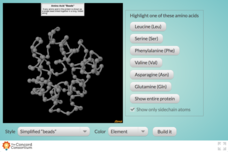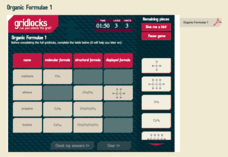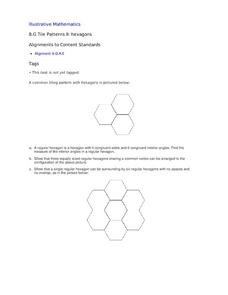Santa Monica College
Lewis Structures and Molecular Shapes
Learners practice drawing Lewis dot structures, build molecules with model kits, and predict molecular shapes using VSEPR theory. The combination of written work and hands-on reinforcement benefits young scientists.
Concord Consortium
Exploring Protein 3D Structure
Presenting protein structure can be difficult! Take young biologists on a 3-D amino acid adventure with a detailed interactive. Pupils view and manipulate common amino acids individually or as a part of a whole protein. Choose from three...
Concord Consortium
Polarization
This is one cool resource for teaching about polarity! Chemistry scholars observe electron distribution and molecular shape as they select different non-metals and form bonds. The interactive offers two views, surface charge and electron...
Concord Consortium
Factors Affecting London Dispersion Attractions
How can non-polar molecules be attracted to one another? Introduce the phenomenon of London dispersion forces to young chemists through an entertaining interactive. Pupils choose from a variety of molecular shape combinations, then pull...
Concord Consortium
Electron Geometry
It's time to whip your chemistry class into shape! Begin your study of molecular geometry with a colorful, 3-D interactive. The resource shows models of linear, trigonal planar, and tetrahedral molecules.
Serendip
Structure and Function of Cells, Organs and Organ Systems
Cells of different organs have unique cell functions. Learn how cell functions vary depending on their roles in the body using an inquiry-based activity. Scholars analyze the cell structure to make comparisons to its functions, allowing...
Royal Society of Chemistry
Shapes of Molecules—Distortion from the Pure Geometry
Ready to introduce the realities of molecular geometry to chemistry pupils? Use a logic-based interactive! Perfect as individual practice, the puzzles explore the bond angles and repulsions present in three common molecular shapes.
Concord Consortium
Exploring Hydrophobic Core
How do the hydrophobic and hydrophilic regions of a protein affect its shape? Science scholars explore the molecular properties of protein molecules using a detailed interactive. The resource allows the user to rotate the protein, view...
Spark Notes
Review of Chemical Bonding: Review Test
This is an online exercise in which chemistry learners answer a series of multiple choice questions about bonding. Topics addressed include ionic and covalent bonds, electronegativity, ions, valence electrons, resonance structure, and...
Royal Society of Chemistry
Shapes of Molecules—Geometry of Central Atom
How is a molecule's shape determined? Explore bond angles, lone pairs, and VSEPR theory through a logic-based activity. Chemists pull together information about the major molecular shapes, then use it to solve puzzles.
Aquarium of the Pacific
Lego Molecules
Young scientists construct an understanding of molecular compounds in this hands-on science lesson. Using LEGO® to model the atoms of different elements, students build molecules based on the chemical formulas of common compounds.
Google
Biochemical Structures
It's truly amazing how life is sustained through the complicated interactions of different organic compounds. As young biochemists complete this worksheet, they demonstrate their ability to identify these essential molecules as well as...
Royal Society of Chemistry
Shapes of Molecules—Hybrid Orbitals
Take your chemistry class' knowledge of molecular geometry to the next level! Introduce orbital hybridization with a series of related games. Individuals complete a data table in the first activity, then solve Sudoku-like puzzles using...
Royal Society of Chemistry
Complex Ion Shapes
Things are really shaping up! Provide young chemists with polyatomic ion practice using an interesting interactive. Individuals complete puzzles focused on molecular geometry and complex ions.
BBSRC
Discovering DNA: The Recipe for Life
A pinch of adenine, a dash of thymine and ta-da, you have life! Well, it's not quite that simple, but through this series of activities and experiments young scientists learn about the structure of DNA and how it contains the recipe...
College Board
2018 AP® Chemistry Free-Response Questions
2018 saw some of the highest AP Chemistry scores in years. The College Board released each test question covering topics from enthalpy to net ionic equations, as well as scoring guidelines and more to benefit future scientists. Example...
Biology Junction
Elements and Macromolecules in Living Things
In this biology learning exercise, students read about macromolecules and elements in living things to answer 56 questions that follow. They also draw the molecular structure of some organic and inorganic molecules.
Royal Society of Chemistry
Organic Formulae 1
Puzzles are the formula for success in organic chemistry! Hydrocarbons abound in the first of two interactives involving basic organic molecules. The easy-to-use lesson is available online and in print form, so you can pick your delivery...
Mr. E. Science
Chemical Reactions
Once I told a chemistry joke, but there was no reaction. Get young chemists involved in changes and reactions with a presentation that begins with physical and chemical changes and chemical reactions. It moves on to chemical...
Towson University
Mystery of the Crooked Cell
Can your class solve the Mystery of the Crooked Cell? Junior geneticists collaborate to learn about sickle cell anemia in a fascinating lesson plan. The included materials help them to examine the genetic factors behind the disease...
Curated OER
Tile Patterns II: Hexagons
After learning that the sum of interior angles for triangles is 108 degrees, take it further to show that the sum of angles in any polygon is the same! Using hexagons, pupils practice finding the measure of the six congruent angles. Make...
American Chemical Society
The Discovery of Fullerenes
Carbon is the most common element on earth, so the innovative discovery of a new type of carbon molecule won the 1996 Nobel Prize. In the ready-to-go lesson, scholars learn about C60 and how it has opened up the entire area of...
Chiral Publishing
Chiral Publishing: An Introduction to Chemistry: Molecular Structures: Acids
Vview molecular structures and formulae of four common acids - acetic, nitric, phosphoric, and carbonic. Manipulate each structure to view it in a three-dimensional format.
Wisc-Online
Wisc Online: Lewis Dot Structures of Covalent Compounds
Short slide show provides basic information about drawing Lewis dot structures for covalent compounds. Starts with anatomy of the atom, and then shows the relationship between atomic particles and the Periodic Table of Elements. Offers...
Other popular searches
- Molecular Structure Lab
- Mineral Molecular Structure
- Building Molecular Structure
- Molecular Structure of Water
- Molecular Shape of Compounds
- Giant Molecular Structure
- Atomic and Molecular Structure
- Lewis Structure Molecular























